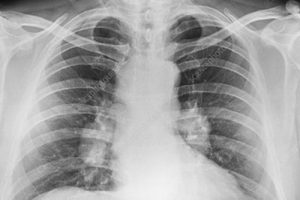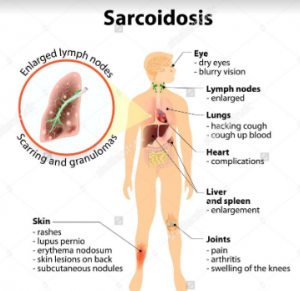SARCOIDOSIS


Sarcoidosis is a disease characterized by the growth of tiny collections of inflammatory cells (granulomas) in any part of your body — most commonly the lungs and lymph nodes. But it can also affect the eyes, skin, heart and other organs.
The cause of sarcoidosis is unknown, but experts think it results from the body’s immune system responding to an unknown substance. Some research suggests that infectious agents, chemicals, dust and a potential abnormal reaction to the body’s own proteins (self-proteins) could be responsible for the formation of granulomas in people who are genetically predisposed.
Clinical features
• Low grade fever, fatigability, myalgias
• Tender reddish bumps or patches on the skin
• Red and teary eyes or blurred vision
• Swollen and painful joints.
• Enlarged and tender lymph glands in the neck, armpits, and groin.
• Enlarged lymph glands in the chest and around the lungs
• Hoarse voice.
• Pain in the hands, feet, or other bony areas due to the formation of cysts (an abnormal sac-like growth) in bones.
• Kidney stones
• Heart failure, Arrythmias, Peri carditis.
• Nervous system :Hearing loss, Meningitis, seizures or psychiatric disorders
Treatment :
• Corticosteroids
• Immunosupressants : Methotrexate, Azathioprine
• Hydroxychloroquine :Hydroxychloroquine
• Tumor necrosis factor-alpha (TNF-alpha) inhibitors: These medications are commonly used to treat the inflammation associated with rheumatoid arthritis. They can also be helpful in treating sarcoidosis that hasn’t responded to other treatments.


